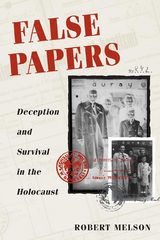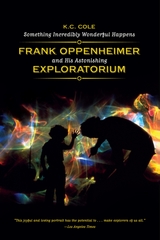2 books about 1912-1985

False Papers
DECEPTION AND SURVIVAL IN THE HOLOCAUST
Robert Melson
University of Illinois Press, 2000
False Papers is the astounding story of a Jewish family who survived the Holocaust by living in the open. By sheer chutzpah and bravado, Robert Melson's mother acquired the identity papers that would disguise herself, her husband, and her son for the duration of the war. Always operating under the theory that one needed to be seen in order not to be noticed, the Mendelsohns became not just ordinary Polish Catholics, but the Zamojskis, a Polish family of noble lineage.
Armed with their new lives and their new pasts, the Count and Countess Zamojski and their son, Count Bobi, took shelter in the very shadow of the Nazi machine, hiding day after day in plain sight behind a façade of elegant good manners and cultivated self-assurance, even arrogance: "you had to shout [the Gestapo] down or they would kill you." Melson's father took advantage of his flawless German to build a lucrative business career while working for a German businessman of the Schindler type. The Zamojskis acquired beautiful homes in the German quarter of Krakow and in Prague, where they had maids and entertained Nazi officials. Their masquerade enabled them to save not only themselves and their son but also an uncle and three Jewish women, one of whom became part of the family.
False Papers is a candid, sometimes funny account of a stylish couple who dazzled the Nazis with flamboyant theatrics then gradually, tragically fell apart after the war. Particularly arresting is Melson himself, who was just a child when his family embarked on their grand charade. A resilient boy who had to negotiate bewildering shifts of identify–-now Catholic, now Jewish; now European aristocrat, now penniless refugee who becomes an American college student--Melson closes each chapter of his parents' recollections with his childhood perceptions of the same events.
Against the totalizing, flattening, unrelenting Nazi behemoth, Melson says, "I wished to pit our very bodies, our quirky, sexy, funny, wicked, frail, ordinary selves." By balancing the adults' maneuvering with the perspective of a child, Melson crafts an account of the Holocaust that is at once poignant, entertaining, and troubling.
Armed with their new lives and their new pasts, the Count and Countess Zamojski and their son, Count Bobi, took shelter in the very shadow of the Nazi machine, hiding day after day in plain sight behind a façade of elegant good manners and cultivated self-assurance, even arrogance: "you had to shout [the Gestapo] down or they would kill you." Melson's father took advantage of his flawless German to build a lucrative business career while working for a German businessman of the Schindler type. The Zamojskis acquired beautiful homes in the German quarter of Krakow and in Prague, where they had maids and entertained Nazi officials. Their masquerade enabled them to save not only themselves and their son but also an uncle and three Jewish women, one of whom became part of the family.
False Papers is a candid, sometimes funny account of a stylish couple who dazzled the Nazis with flamboyant theatrics then gradually, tragically fell apart after the war. Particularly arresting is Melson himself, who was just a child when his family embarked on their grand charade. A resilient boy who had to negotiate bewildering shifts of identify–-now Catholic, now Jewish; now European aristocrat, now penniless refugee who becomes an American college student--Melson closes each chapter of his parents' recollections with his childhood perceptions of the same events.
Against the totalizing, flattening, unrelenting Nazi behemoth, Melson says, "I wished to pit our very bodies, our quirky, sexy, funny, wicked, frail, ordinary selves." By balancing the adults' maneuvering with the perspective of a child, Melson crafts an account of the Holocaust that is at once poignant, entertaining, and troubling.
[more]

Something Incredibly Wonderful Happens
Frank Oppenheimer and His Astonishing Exploratorium
K. C. Cole
University of Chicago Press, 2012
How do we reclaim our innate enchantment with the world? And how can we turn our natural curiosity into a deep, abiding love for knowledge? Frank Oppenheimer, the younger brother of the physicist J. Robert Oppenheimer, was captivated by these questions, and used his own intellectual inquisitiveness to found the Exploratorium, a powerfully influential museum of human awareness in San Francisco, that encourages play, creativity, and discovery—all in the name of understanding.
In this elegant biography, K. C. Cole investigates the man behind the museum with sharp insight and deep sympathy. The Oppenheimers were a family with great wealth and education, and Frank, like his older brother, pursued a career in physics. But while Robert was unceasingly ambitious, and eventually came to be known for his work on the atomic bomb, Frank’s path as a scientist was much less conventional. His brief fling with the Communist Party cost him his position at the University of Minnesota, and he subsequently spent a decade ranching in Colorado before returning to teaching. Once back in the lab, however, Frank found himself moved to create something to make the world meaningful after the bombing of Hiroshima and Nagasaki. He was inspired by European science museums, and he developed a dream of teaching Americans about science through participatory museums. Thus was born the magical world of the Exploratorium, forever revolutionizing not only the way we experience museums, but also science education for years to come.
Cole has brought this charismatic and dynamic figure to life with vibrant prose and rich insight into Oppenheimer as both a scientist and an individual.
[more]
READERS
Browse our collection.
PUBLISHERS
See BiblioVault's publisher services.
STUDENT SERVICES
Files for college accessibility offices.
UChicago Accessibility Resources
home | accessibility | search | about | contact us
BiblioVault ® 2001 - 2024
The University of Chicago Press









